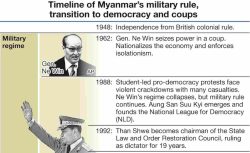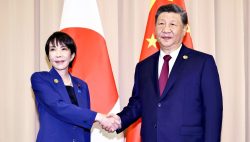Ruling Parties and DPFP: Why Is a Helping Hand Being Given to a Prime Minister Who Has Lost Trust?
15:00 JST, November 2, 2024
It is not wrong for the Liberal Democratic Party and its junior coalition partner Komeito, which collectively fell and became a minority ruling coalition as the result of the recent House of Representatives election, to seek cooperation from opposition parties to continue to hold onto power. However, shouldn’t the process work the other way around?
First of all, it is proper for a prime minister to resign from the post to take responsibility for an election defeat, and for the next LDP president to work toward a new coalition framework.
The secretaries general and other officials of the LDP and the Democratic Party for the People (DPFP) have met and decided to begin policy discussions between the three parties, including Komeito.
The LDP and Komeito fell short of a majority as the result of the lower house election. Their aim in starting policy discussions with the DPFP is to ensure the passage of bills and the budget.
Under such circumstances, the LDP and Komeito should formally request the DPFP to join the coalition. However, at the meeting, the LDP requested the establishment of a council with the DPFP where various policy matters can be comprehensively discussed. The DPFP instead insisted on a system of discussing each policy individually, and the LDP accepted this.
The likely reason the DPFP insisted on policy-by-policy discussions is that it thinks it should not form a coalition with a prime minister who lost the public’s trust, as shown in the election.
Additionally, if the DPFP formally joined the coalition, it would become jointly responsible for various policies. If the DPFP wants to avoid such a situation and only advance policies that are advantageous for themselves, the passage of every bill would be impacted, and it would not lead to political stability.
The DPFP is calling for the so-called annual income barrier, above which income tax is levied, to be raised above the current ¥1.03 million level, and for the “trigger clause,” which temporarily lowers gasoline taxes, to be triggered. Such policies would lead to the shelving of discussions on the issue of fiscal sources and may lead to hand-outs being given out carelessly.
When the LDP suffered a crushing defeat in the 2007 House of Councillors election, current Prime Minister Shigeru Ishiba pressed then Prime Minister Shinzo Abe to step down. Ishiba urged then Prime Minister Taro Aso to step down prior to the 2009 lower house election, when the latter’s approval rating was in the doldrums.
He argued that it was important to draw a line. But when he took up the post of prime minister, he turned a blind eye to the issue of responsibility and stayed in the position. In circumstances such as these, he cannot regain the trust of the people.
What was the prime minister’s campaign slogan for the latest lower house election — “upholding the rules”?
Meanwhile, the DPFP has said that if the election for prime minister in the special Diet session goes to a runoff between Ishiba and Constitutional Democratic Party of Japan leader Yoshihiko Noda, it will not choose either and instead write the name of party leader Yuichiro Tamaki.
The fact that its members have chosen not to abstain or cast blank ballots in the runoff, which is a choice between the top two candidates, and will instead write the name of their own party’s leader can only be called contempt for the meaning of a runoff election.
Can the DPFP expect voters to understand this move that will only help the current prime minister stay in power?
(From The Yomiuri Shimbun, Nov. 2, 2024)
Top Articles in Editorial & Columns
-

Myanmar Will Continue Under Military Rule Even After Election, Ex-Ambassador Maruyama Says in Exclusive Interview
-

40 Million Foreign Visitors to Japan: Urgent Measures Should Be Implemented to Tackle Overtourism
-

Expansion of New NISA: Devise Ways to Build up Household Assets
-

China Criticizes Sanae Takaichi, but China Itself Is to Blame for Worsening Relations with Japan
-

Withdrawal from International Organizations: U.S. Makes High-handed Move that Undermines Multilateral Cooperation
JN ACCESS RANKING
-

Univ. in Japan, Tokyo-Based Startup to Develop Satellite for Disaster Prevention Measures, Bears
-

JAL, ANA Cancel Flights During 3-day Holiday Weekend due to Blizzard
-

China Confirmed to Be Operating Drilling Vessel Near Japan-China Median Line
-

China Eyes Rare Earth Foothold in Malaysia to Maintain Dominance, Counter Japan, U.S.
-

Japan Institute to Use Domestic Commercial Optical Lattice Clock to Set Japan Standard Time



















